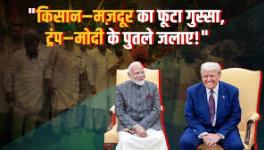There’s a Whole Ideological Package That Goes With Raising Interest Rates: Fadhel Kaboub
Fadhel Kaboub, Associate Professor of Economics at Denison University.Image Courtesy:Denison University Website
Modern Monetary Theory (MMT) is an alternative economic framework that challenges the conservative neo-liberal narrative of ‘free trade’ and ‘competition’ which has held sway for many decades as the way to global prosperity. In simple terms, MMT makes us see that money is completely a creation of the State, and hence, a sovereign government does not need our money (either through taxes or borrowing) in the first place to strategically spend it, that is, without causing inflation. And that frees the ‘fiscal’ constraint to address the most pressing problems of our times: socio-economic inequality, exclusion and climate change.
Fadhel Kaboub, Associate Professor of Economics at Denison University, Ohio (US), and President of the Global Institute for Sustainable Prosperity, is a leading voice in the global MMT community and among a handful of economists who speaks of MMT’s relevance for emerging countries like India. In this first part of a two-part ilong-distance nterview with independent journalist Sowmya Sivakumar, he explains how MMT is slowly shifting the debate in the US, with important lessons for India and rest of the world. Edited excerpts:
Sowmya Sivakumar: The US Federal Reserve has been aggressively raising interest rates through the year. But, in August, the Inflation Reduction Act was unexpectedly passed by the Congress, and then came the student debt cancellation. Could we say in a sense that the US government is trying to ‘implement’ MMT? Or is it just something piecemeal?
Fadhel Kaboub: The US government is certainly influenced by MMT insights, but it has not completely understood the MMT framework, and is not using the full kind of monetary sovereignty and fiscal policy space that MMT allows it to.
Pre-Covid, MMT economists had identified four major inflation pressure points in the US: energy and transportation, healthcare, housing/real estate sector, and higher education.
From an MMT perspective, you should be doing two things to address them: a) increase productive capacity in these sectors so output becomes more available, and b) tax and regulate abusive market power. Based on that pre-Covid inflation analysis, the whole package of policies that MMT-ers recommended came under the umbrella of what we call the ‘Green New Deal.’
The Green New Deal included decarbonising the grid, Medicare for all, housing for all, free public education for all, and student debt cancellation — and taxing and regulating abusive market power of the powerful, the oligarchs, the oil companies — not because we need their money or their permission to have a Green New Deal, but because we want to democratise the economy.
Covid added to these inflation pressure points on the health care front and with supply chain disruptions, because decades of globalisation has meant lean and mean supply chains. The Russian invasion of Ukraine further added to energy and food related pressure points.
Now, the newly-passed Inflation Reduction Act has bits and pieces of the original Green New Deal that was already watered down to the Build Back Better Bill, which even the Democrats rejected. It did shift the conversation about inflation from the old paradigm which says: every time you have inflation, raise interest rates, and reduce the deficit.
But it has made progress on a very small scale.
On the other hand, we still have the Fed raising interest rates like crazy. This is definitely not consistent with the MMT understanding, because raising the interest rate will not increase productive capacity, or reduce the abusive power of oil and gas or shipping companies, and so on. Everything the Fed is doing will not even put a dent on inflation. In fact, it might fuel inflation.
So it’s a half-and-half, confused, incoherent approach with patchwork type of policies. The government is not really going all the way.
SS: And why?
FK: Because the US government still fears the deficit. The Inflation Reduction Act could have been labelled ‘The Deficit Reduction Act’, because it is designed and presented as a ‘paid-for’ or a ‘deficit-neutral’ programme.
They've ‘sold’ the increases in taxes on corporations and higher income groups as a way to pay for this Act. So the government is still living in two worlds — a world that is inspired by MMT insights in terms of where the inflation pressure points are, and the other world that tells it, you should not have larger deficits or new programmes not paid for by higher taxes, because that will fuel inflation. While MMT will tell you, you kill inflation by spending more in the targeted sectors, not less.
Unfortunately, the government’s massive early Covid spending neglected targeting the inflation pressure points.
In a system with so many vulnerabilities building up over decades, at the first instance of crisis, they will be exposed. And so was the fact that we were relying on a workforce that was abused because it didn't have any other choices. Now, after the Covid shutdown experience and a little bit of the stimulus, workers are saying, “well, we do need health care. We do need child care and transportation and assistance with housing.”
And we're finding it very difficult to bring people into the labour force with the current wages. Though wages have been increasing slightly, they're certainly not catching up with the inflation or the cost of living that was neglected and shoved under the rug for decades.
SS: So why are there labour shortages, when the cost of living is going up? Is it correct that labour unemployment rates aren't exactly high right now* in the US?
FK: The official unemployment rate is low, but, this rate does not capture the full extent of what you and I colloquially would call unemployment, because the official statistics only count those who are ‘actively seeking work’ in the last four weeks.
But when the Bureau of Labor Statistics (BLS) conducts their survey, they actually ask workers, “well, why were you not actively seeking work in the last four weeks?” And ‘actively seeking work’ or ‘ASW’, is a very important technical definition.
It means you're turning in resumes, doing job interviews, going to employment agencies, and trying to do everything you can to find employment. But if you say, well, “I did everything to find work for the last six months, but in the last four weeks specifically, I don't think there's any company or job available. I'm still waiting for replies.” Then you're labelled a ‘discouraged worker’. And, technically speaking, discouraged workers are not counted officially as unemployed. They're ‘out of the labour force’.
So we have several categories of people excluded from the official unemployment rate.
Some people apply for a job, get it, and start working, but cannot make it every day on time, because they cannot afford to have their own car and the job doesn't pay enough, and there's no public transportation. Others can't keep a job because it doesn't pay enough to have somebody take care of their children or an elderly family member at home, and they don't have family help.
During the Covid crisis, a lot of these structural issues started to appear more obviously. It has to do with the cumulative effect of decades of neglecting and abusing working class people, by not providing employment that includes universal child care benefits, public transportation and so on.
And in many cases, lower income individuals qualify for government support if they're unemployed and poor; but if they start working, their income brings them slightly above the poverty line, and then they lose all of those public benefits (say, housing or child support), so they drop back.
So, a lot of people make the decision that it's actually better not to work. Because work doesn't actually improve your quality of life and standards of living, work forces you to lose all those benefits, and now you have to pay rent or find healthcare in the private sector.
It's not like people don't want to work. Most people want to work. But provide them the dignity of work and the dignity of life that that everybody deserves.
The Fed, on the other hand, is operating under a strictly non-MMT, mainstream analytical framework that suggests there is a strict trade-off between unemployment and inflation. And after several months of raising interest rates and inflation not reacting the way the Fed expects it to, it has openly said it is willing to impose severe pain on the economy and keep raising rates, even if it means massive job losses.
Whereas the MMT approach says, you can actually eliminate this trade-off and produce both, full employment and price stability.
SS: Can MMT be imposed on any kind of political framework, or does it require, or do better in a certain political system?
FK: Very good question. MMT is technically politically neutral. MMT simply says — Here's your economy. Here's your productive capacity. Here's the existing power structures that you have in the system in a descriptive way. And then it says: Given these conditions, this is how much fiscal policy space you have, this is how much the country can spend before you hit the inflation barrier, so to speak.
And then MMT says how that fiscal policy space can be increased or shrunk. MMT does not tell you what you should spend on. You can spend it on military. You can spend it on public health or on education. So if you are interested in full employment or climate policies, we can tell you how you should target the spending and prevent the inflationary pressures.
But if you have a President and Congress that says, “we want to invade Country X”, or “we want to increase inequality”, then MMT insights can also tell you how to do that without causing inflation! Of course, it will have consequences, social consequences, people will die, all kinds of things…
That's a political choice to be made. MMT doesn't dictate political choices. It just tells us, here's the menu of choices available to you. Each choice will have economic and social consequences. Sure, the voices you frequently hear in the MMT community are concerned with the big problems, of socioeconomic exclusion or climate change or crushing debt for consumers and students. But the starting point is always an analytical point, that's politically neutral.
SS: There is also concern that MMT can be misused by any government to gain more political power, even in, say, anti-democratic or anti-secular ways.
FK: Absolutely. That’s why we don't present MMT insights to governments only, we present them to the public, to the media…
SS: But the media here (India) is largely controlled by the government, so it’s very tough to get in even an objective view…
FK: Same thing in the US. The media concentration is part of the abusive market power that we describe. And yet MMT insights are breaking into mainstream media, on major news networks, not in a dominant way, but in a way that allows some well-meaning professional journalists, who actually want to understand what's causing inflation, to give a platform to MMT economists. And those journalists who have no political affiliation, so to speak, are saying, “Well, that makes sense. Now let me hear what the mainstream economists are saying, and they are saying the same old things. So their reaction is, “Well, we've heard that before, and it's not adding up. In the meanwhile, this MMT narrative is strange and new and unusual, but it's certainly making more and more sense every day. So I'm going to keep listening to them until you, the mainstream, give me a convincing counter argument other than “this is voodoo economics, and I don't like it”, because that's not convincing.
So that’s why there are two things to do: one is to present MMT insights not just to governments, who can abuse the ideas, but also to the public, so it's a democratic process. And two, present the full MMT approach, which is yes, you can spend more, but you also have a real inflation constraint.
SS: The Government of India says it wants to prioritise growth. But the Reserve Bank of India (RBI) is being forced to raise interest rates because the US Fed is doing so, and it wants to ensure exchange rate stability. How would MMT approach this dilemma?
FK: This is a common issue that you see across the Global South countries. The exchange rate becomes an important policy variable, more important sometimes than other domestic priorities, because many of their economic constraints are related to dollar-denominated transactions.
There's another unfortunate aspect in the economics profession. It is this belief that one way to strengthen your economy is by having a strong exchange rate, and one way to fight inflation is by raising interest rates, so the focus of the central bank becomes raising interest rates at any cost.
But this is really an economic ideology that says, if we set inflation as the primary policy target for the central bank, then we're going to have to accept that there's going to be more unemployment.
So, the RBI faces the same criticism from MMT (as the Fed). Is raising interest rates actually targeting the sources of inflation? Otherwise it's gratuitous pain for your economy, for your people.
In many cases, the actual sources of inflation that you want to tame are in the jurisdiction of Parliament, and not the RBI.
Also, India is not willing to regulate its capital flows. One way to prevent capital flows is to actually have capital controls, or some better forms of regulations to protect your exchange rate and economy from these external shocks. So, there's a whole ideological package here that goes with raising interest rates. You believe in free markets and in the free movement of capital at any cost.
(to be concluded)
*at the time of the interview which took place end-August.
(Part 2 of the interview will examine the relevance of MMT for India and emerging economies).
Sowmya Sivakumar is an independent journalist.
Get the latest reports & analysis with people's perspective on Protests, movements & deep analytical videos, discussions of the current affairs in your Telegram app. Subscribe to NewsClick's Telegram channel & get Real-Time updates on stories, as they get published on our website.
























